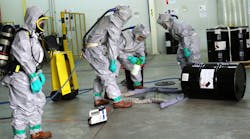Crisis preparation and management standards are falling short in almost a third of businesses, according to a report released by Chemtrec.
The survey shows that almost a third of businesses (28%) under-prioritize their chemical emergency response and crisis management, with 63% being coordinated by management or department teams rather than at a C-suite level (19%) and less than 3% of organizations employ a full-time crisis management professional.
In ranking their organization’s preparedness for a crisis out of 10, where 10 is the most prepared, 17% gave their companies a score of five or lower.
“The survey has shown us that businesses across the world are putting crisis management and emergency preparedness plans in place, but many are not doing enough to ensure they’re enforced, stress tested, or kept up-to-date, said. Bruce Samuelsen, Chemtrec’s CEO, in a statement.
Global Readiness
Emergency preparedness and crisis management are coming under greater scrutiny. So the survey asked crisis leaders, including chemical producers, logistics partners and end users, to determine the level of crisis readiness globally.
They asked about the level of coordination between business continuity and crisis management systems. Only 11% of respondents feel the two systems are integrated, with 33% saying they’re not clear how the two systems operate and respond in a unified manner during a crisis. This is despite the knowledge that a fully functioning relationship between the two is crucial to ensuring a company's reputation is maintained should disaster strike.
The survey also sought to discover to what extent global businesses conducted regular crisis simulation exercises to test whether policies and plans are fit for purpose. Good practice recommends that simulation exercises occur at least annually, however, 19% stated exercises occur only every two or more years at best, and 18% of businesses admitted to having no stress testing plans at all.
Crisis management and response training is similarly lacking, with 31% of respondents saying they don’t regularly take part in training programs. Given this lack of training, it is unsurprising that 4 in 10 people do not understand their crisis management and emergency ‘response’ roles and responsibilities.
